PODCAST - Eye for Iran: 'Not Free and Fair' Elections in Iran
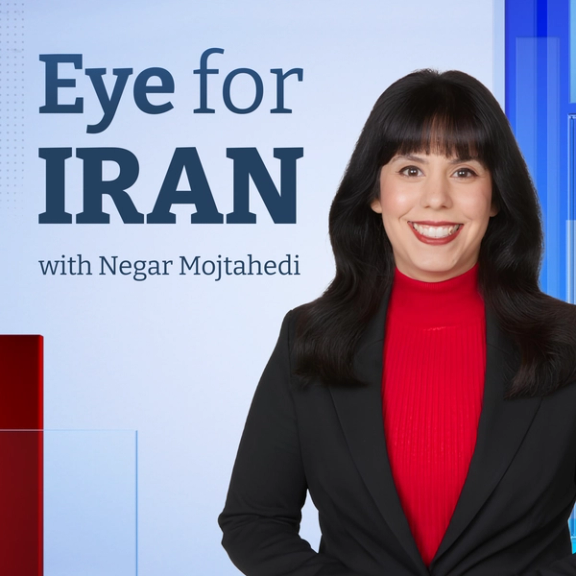
Iran's June 28 snap presidential election is a race dominated by hardliners which is widely considered by critics as a "selection", highly engineered by the state.

Iran's June 28 snap presidential election is a race dominated by hardliners which is widely considered by critics as a "selection", highly engineered by the state.
In this week's episode of ‘Eye for Iran,' host Negar Mojtahedi speaks to author and journalist Arash Azizi, and Gabriel Noronha, who served as the Iran advisor to the US State Department during Trump's presidency, about the six candidates approved by the Guardian Council to run and what they mean for the future of Iran.
Who will succeed the late president Ebrahim Raisi? Will the 'Woman, Life, Freedom' movement impact the outcome of the elections?
'Eye for Iran' attempts to answers those questions and more.
Azizi and Noronha both believe Mohammad Bagher Ghalibaf is a top contender to win, and the reason has to do with Iran's Supreme Leader Ali Khamanei and his age.
"I think the most important question for the future Iran right now is what's going to happen when Khamenei dies...I think Iran after Khamenei is moving into a definitely less clerical and even less Islamist ideology in many ways, into more of a military authoritarian state," said Azizi.
With there being one moderate in the mix, namely Masoud Pezeshkian, Noronha believes it won't make much of a difference. He said "there's the talk about the moderates and the reformists. I don't believe at this point, if you're part and parcel of the Iranian government and establishment, that there is a real reformist movement left at all. And I don't think most of the Iranian people really believe that there's much of a difference at this point."
Watch and listen to this week’s episode of ‘Eye for Iran’ as your host and guests dig into these topics.

Less than two weeks before voting day, there is little sign of the upcoming presidential election among the Iranian public, which appears indifferent. Some speculate this might change, but that seems unlikely given the trend in recent elections.
The six candidates, handpicked by the regime, have so far confined their campaigns to free appearances on state television, participating in dull interviews that have failed to engage or motivate viewers.
It appears the Islamic Republic has run out of politicians who can effectively communicate with the public. The same familiar faces appear on television news daily, offering generic statements like, "We need to use all potentials to turn threats into opportunities!" These platitudes are repeated about nearly every issue, from increasing wheat production or imports to addressing the need for higher salaries and reducing the 50% annual inflation rate.
In the TV interviews, the candidates are often seen sitting, appearing as if they are in great agony. Smiles are rare, as are new and interesting comments or any sense of humor.
The interviewers seem hesitant to ask serious questions about anything. Foreign policy and the nuclear issue are not discussed, suggesting they have been perhaps instructed to avoid sensitive topics. For the first time, state television has openly acknowledged censoring candidates' statements. In at least one instance, the broadcast of an interview with candidate Mohammad Bagher Ghalibaf was delayed for this reason.
The only candidate who has so far been observed to try to be charming is right-wing cleric Mostafa Pourmohammadi who is being presented as a 'moderate" candidate. He was brave enough to speak against restrictions on social media.
The cleric is the only one of the six candidates who occasionally manages to smile, a stark contrast to his 45 years of habitual frowning. Additionally, he stands out for his well-tailored clerical robes and good taste in color coordination, a notion seemingly loston the other candidates.
He is the only candidate with an organized campaign and a campaign manager well-known to Iranians interested in cultural issues. His campaign manager, Hojjatollah Ayubi, is recognized as one of the most liberal officials the Islamic Republic has ever had in the area of cinema. In contrast, other candidates have typically selected individuals with military or political backgrounds. These factors make Pourmohammadi, who has a controversial background in the judiciary, security, and intelligence affairs, stand out among the six candidates.
Unlike the other candidates, he is transparent about his association with Nameh News, the website that supports him and which he has always been behind. In contrast, other candidates have never publicly associated themselves with the numerous media outlets that serve their interests and are often funded by the government. For instance, Hamshahri newspaper and its affiliated publications support Mayor Zakani, while the hardline websites Raja News and Mashregh News advocate for Jalili's candidacy.
Massoud Pezeshkian likely has the best access to media, with the Reform Front endorsing his candidacy. His images are prominently featured in the two centrist dailies, Ham Mihan and Sazandegi, although these publications occasionally criticize him for one or two mistakes.
Next week the campaign scene will probably change as candidates are to face each other in televised debates. Unlike current interviews that are being aired in a fragmented way from various channels with varying degrees of popularity and viewership and deprive the candidates from being seen by the right viewers at the right time, the debates will be aired from the key channels such as the news channel IRINN at a time that suits most viewers.
State TV has openly stated that it will moderate the debates and has warned candidates to avoid controversial and sensitive issues. However, it will be difficult for most candidates to appear as timid as they do in the interviews, as they might have to respond to accusations and counter-accusations.
But will they have anything different and interesting to say? That remains to be seen. Will the public pay attention to the candidates and their statements? That is an even bigger question.
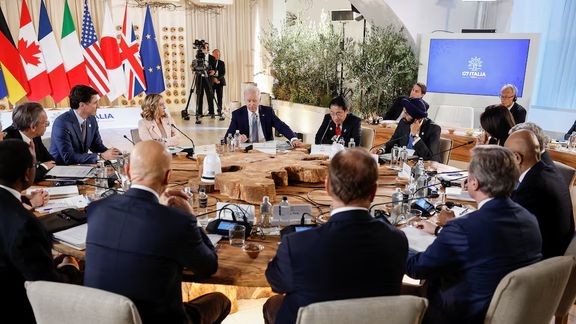
The Group of Seven leaders warned Iran Friday not to give Russia ballistic missiles, only a day after the two countries’ much-publicized strategic agreement was confirmed to have been halted due to “issues” on the Iranian part.
Iran and Russia have grown closer due to the war in Ukraine, which has resulted in sweeping sanctions on Russia from the US and the EU. Iran has supplied Russia with hundreds of kamikaze drones, and unofficial reports suggest that Tehran may be considering enhancing its assistance with missiles.
"We call on Iran to stop assisting Russia’s war in Ukraine and not to transfer ballistic missiles and related technology, as this would represent a substantive material escalation and a direct threat to European security," the G7 stated.
In February, Reuters reported that Iran had provided Russia with “a large number of powerful surface-to-surface ballistic missiles”. The claim was later repeated by UK defense secretary Grant Shapps, who indicated that he had such information but refused to offer details..
Iran and Russia have been working on a long-term agreement for a few years now, hoping to set in stone a trend that has seen Tehran and Moscow expand and deepen ties.
The new comprehensive cooperation agreement was conceived under former President Hassan Rouhani and officially announced by his late successor, Ebrahim Raisi. “Documents of strategic cooperation can outline the horizons of the [two countries’] relations over 20 years,” Raisi said after he met Putin and presented the draft in 2022.
The agreement was expected to be signed this year, but the Russian side announced Wednesday that the process was halted due to “issues faced by our Iranian partners.” Russia's TASS news agency then quoted foreign minister Sergei Lavrov as saying that several "procedural legislative actions" must be completed before the agreement can be signed.
It is unclear what the “actions” are and if it is related to the unexpected, upcoming presidential elections in Iran, which were announced after Raisi died in a helicopter crash last month.
Earlier on Friday, it was announced that Russian President Vladimir Putin and Iran’s acting president, Mohammad Mokhber, had talked on the phone Thursday evening, in what seems to be the latest attempt to counter rumors surrounding the ‘halt’ of the two countries’ comprehensive agreement.
“Both sides expressed their interest in further development of Russian-Iranian cooperation,” according to the Kremlin, “including in implementing promising joint projects in energy and transport.”
Reza Talebi, Iran International's political correspondent, believes the ‘halt could be a strategic move by Putin to exert more pressure on an isolated Iran.
"It's a message from Vladimir Putin to Tehran, warning them not to alter their policies, particularly concerning Ukraine and the Gaza conflict. Additionally, it aims to pressure the incoming Iranian government into negotiations to secure more favorable terms," he stated.
Under severe international sanctions, Russia and Iran have expanded their economic ties, with mutual trade standing at $4 billion, which even Iranian officials admit is far below the target of $40 billion.
The two countries reached an agreement in December to eliminate the use of the US dollar in bilateral trade, a development heralded by Iran's central bank governor as a "new chapter." However, the move has more of a symbolic significance than a real economic act.
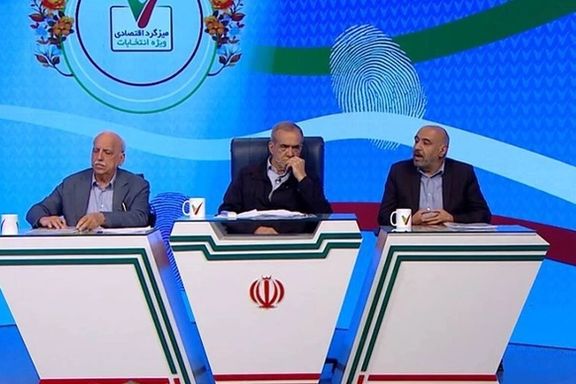
Pro-reform candidate Massoud Pezeshkian argued in his first economic discussion aired on state television that Iran's international isolation must end and that foreign investment is essential for economic improvement.
Pezeshkian was accompanied by two economic advisers and was questioned by three economic experts during the 45-minute program about his proposed plans. Throughout the program, however, he insisted that he was not an expert and would only follow the advice of economists.
“As a physician, I will ruin everything if I enter the economic arena [on my own],” he said. Some of his critics on social media charge that without economic knowledge he is more likely to ruin the economy anyway.
“Instead of establishing cooperation and attracting investment they do something else [that defeats the purpose]. We cause such catastrophes even when an investor comes to our country that they regret their decision to invest here,” Pezeshkian said.
“Bringing foreign investment can prevent the [continuation of] current pressures,” he said while also criticizing policies that have resulted in the country’s brain-drain problem.
Pezeshkian's remarks are typical of regime insiders, who when compelled to address the worsening economy, avoid mentioning the real reasons for Iran's isolation: its confrontational foreign policy and its controversial nuclear program. Their typical response is to blame inefficient officials, who do not fully follow policies and laws.
Iran's average annual economic growth rate for the past 12 years has been around zero, with international sanctions on oil exports and international banking devastating the economy and preventing investments. Tehran has also refused accession to global financial transparency conventions, which has further impeded foreign investments.
Ahmad Midari, one of the two advisers accompanying Pezeshkian, mentioned that tensions caused by political factionalism in the foreign policy apparatus and other government bodies was an impediment to the economy that Pezeshkian’s government would try to eliminate.
“The truth of the matter is that those who are unfairly called ‘pro-West’ are executives who were in a position of authority when the establishment decided to negotiate with the West or were employed at such times due to their expertise in negotiation,” he said.
In his introduction to the program, Pezeshkian pointed out that official figures indicate the inflation rate has been over 40 percent between March 2021 and March 2023 and that excluding oil the economic growth rate was negative.
All the presidential candidates have admitted that the economy is in trouble, but none have directly attributed it to Tehran's foreign policy, because that would be viewed as a criticism of Supreme Leader Ali Khamenei.
Pezeshkian, however, tried to highlight some negative economic indicators. The government’s debt to the Central Bank has more than doubled to $5.4 billion since March 2021 and its debt to other banks has doubled to $13.5 billion, he said, adding that during the same time the value of securities issued by the government has reached $12.4 billion from $5.5 billion.
Pezeshkian has been criticized for his choice of economic advisers due to their very different expert views. Hossein Abdo-Tabrizi, a former secretary general of the Tehran Stock Exchange (2003-2005), founder of a private bank (Eghtesad Novin), and owner of the banned Sarmayeh (Capital) newspaper is known for defending a free market economy while Midari, deputy minister of cooperatives, labor and social welfare under Hassan Rouhani, upholds left-leaning views and is a researcher in poverty.
Conservative politician Yahya Al-e Es'haq who was a former head of the Tehran Chamber of Commerce and served as minister of commerce under Akbar Hashemi-Rafsanjani sat on the three-member panel that questioned Pezeshkian and his advisers.
Al-e Es'haq was heard several times during the program saying “well said, well said” in response to Pezeshkian’s remarks including when he argued that there was no shortage of laws and problems stemmed from neglecting the existing ones.
Another member of the panel, Davoud Danesh-Jafari who currently sits on the Macro-Economy Committee of the Expediency Council and served as minister of economy under Mahmoud Ahmadinejad also occasionally showed his approval of Pezeshkian and his advisers by nodding his head.
The third 'expert' on the panel, Mohammad-Hossein Hosseinzadeh-Bahraini, a cleric and former lawmaker, tried to pressure Pezeshkian into admitting that he supported the elimination of fuel subsidies—an admission that could alienate the public. However, Pezeshkian responded by stating that he would rely solely on expert opinions if such a measure was necessary and would keep the public informed of the details.
Sudden announcement of an increase in fuel prices under Hassan Rouhani resulted in unrest across the country in 2019, during which security forces killed at least 1,500 protesters.
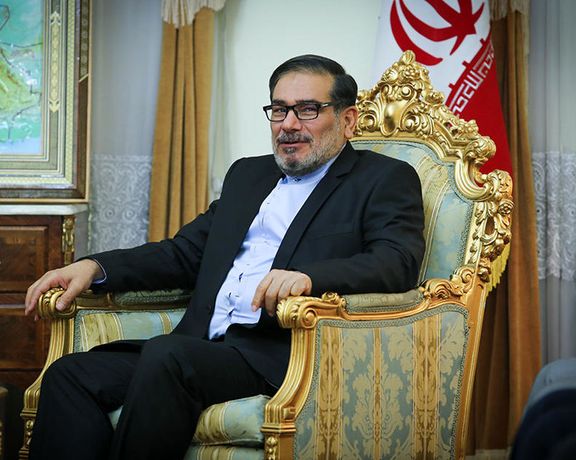
Ali Shamkhani, advisor to the Supreme Leader and apparent nuclear negotiator, stated on Friday that Iran "won't bow to pressure" amidst US warnings regarding its uranium enrichment activities.
“Iran's nuclear program relies on national will and development strategy,” Shamkhani wrote on X. “The US and some Western countries would dismantle Iran’s nuclear industry if they could.”
The US issued a warning to Iran, stating they will “respond accordingly” if Iran continues to accelerate its nuclear program. This came shortly after the UN nuclear watchdog, the International Atomic Energy Agency (IAEA), highlighted Tehran's expanding uranium enrichment.
The IAEA’s report revealed Iran's response to a censure resolution, indicating expanded uranium enrichment at two underground sites. Iran rapidly installed more uranium-enriching centrifuges at its Fordow site and began work on additional ones at its Natanz facility, the report said.
A week ago, The IAEA's Board passed a resolution urging Iran to cooperate and reverse its decision to bar inspector visits, with the US stressing the need for Iran's compliance. Britain, France, and Germany tabled the resolution, which the US reportedly opposed but later endorsed. Only Russia and China voted against the measure.
Shamkhani, an old-guard military figure who served as the secretary of Iran’s Supreme National Security Council until last year, had previously warned of a "serious and effective response" if European nations pursued the resolution.
According to an IAEA assessment, Iran is enriching uranium to 60% purity, approaching the 90% threshold typical of weapons-grade material. Additionally, it has accumulated enough material for additional enrichment, potentially resulting in three nuclear warheads.
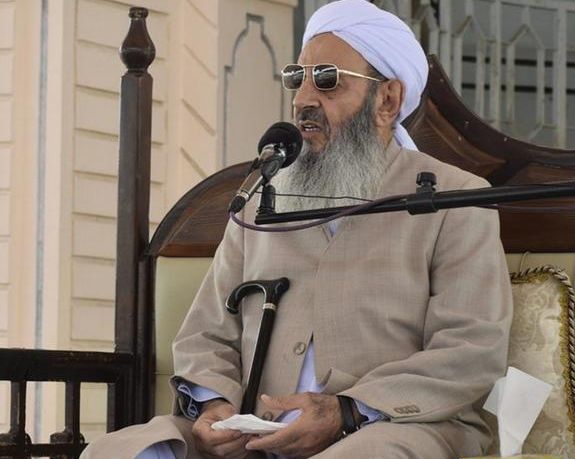
Iran’s Sunni leader Mowlavi Abdolhamid spoke out against the exclusion of a prominent Sunni figure from the presidential race.
A vocal critic of the government's ineffectiveness and systemic discrimination, he blasted the rejection of the Sunni candidate as a sign for the lack of progress toward inclusivity within the establishment.
During his Friday prayer sermons in Zahedan, the provincial capital of Sistan-Baluchestan, he emphasized that "policy changes and improved coordination among governing bodies are necessary to make the president's actions effective and avoid repetitive outcomes."
Jalal Jalalizadeh, a Sunni former representative of Sanandaj in the Iranian parliament, was blocked from running in the elections.
The unelected 12-member Guardian Council, responsible for vetting candidates, approved only six out of over 80 who applied to run, disqualifying prominent figures such as former parliament speaker Ali Larijani and former president Mahmoud Ahmadinejad.
Iran is preparing for snap presidential elections following the death of President Ebrahim Raisi in a helicopter crash on May 19. Vice President Mohammad Mokhber currently serves as the acting president.
As Iran's most prominent Sunni cleric, Abdolhamid has consistently criticized the regime for its discriminatory policies against the Sunni population in political and social spheres.
Sunni Muslims make up around 10 percent of Iran's 88 million people, with many facing economic and political marginalization. They are primarily concentrated in border regions spanning from Sistan-Baluchestan in the southeast to Kurdistan in the northwest.